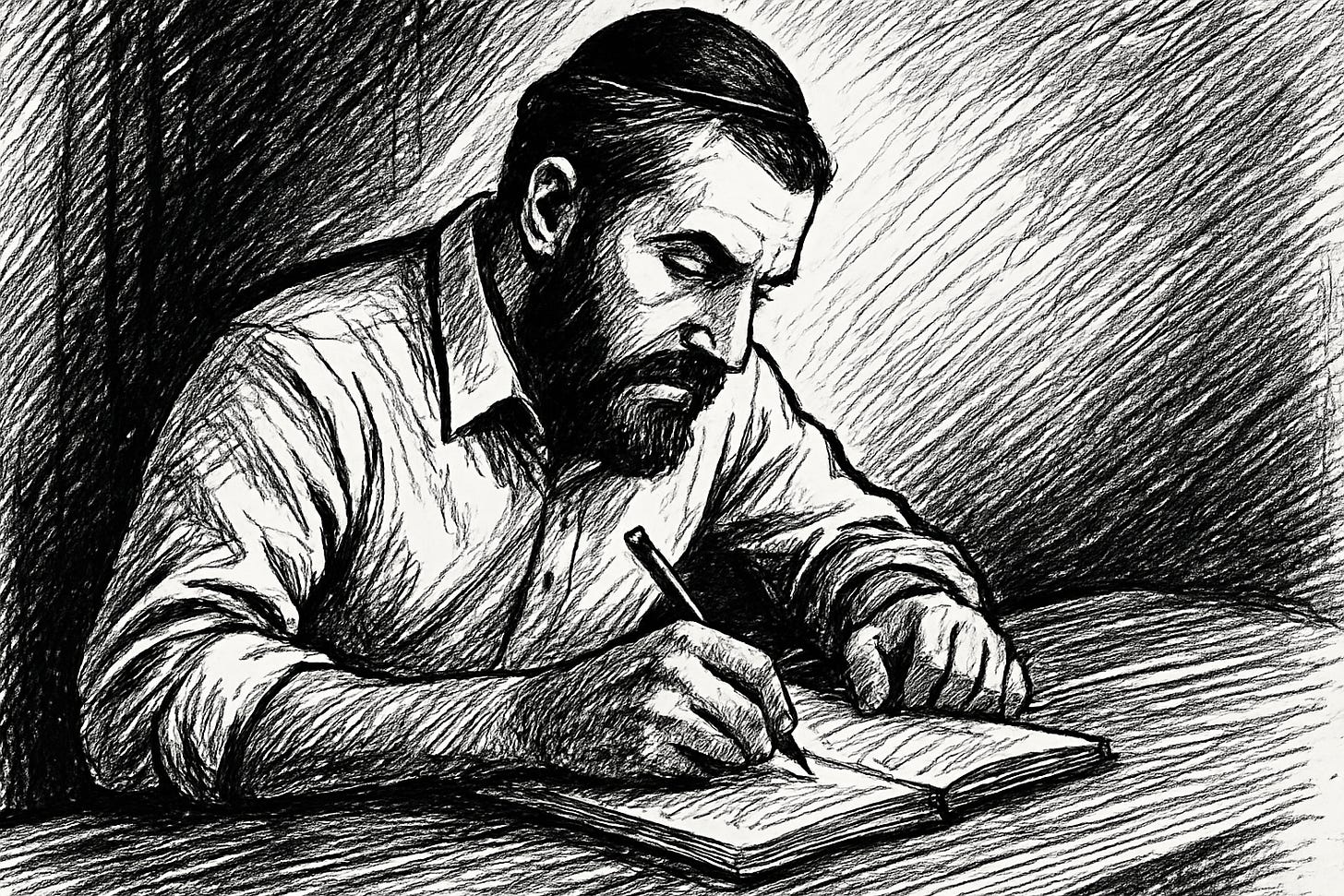Gibor Guide: From Vows to Victories
A Battle Plan for Resolutions That Last
I was reading Rav Avigdor Miller’s booklet “Toras Avigdor” on Rosh Hashanah.
He asked a very simple question.
“What do you have to offer?”
You are asking for Teshuva, for all the goos things to happen to you this year. but what are you willing to give?
Perhaps this is not the feel-good question you expected, but you are a Gibor, and a Gibor needs to take the hard questions too.
Every Elul, men make promises that collapse before Tishrei is even warm.
“I’ll learn five hours every day.”
“I’ll never lose my temper again.”
“I’ll say Tehillim every morning before work.”
We mean them. We even feel them in our bones. But like leaves in the wind, they scatter.
Why?
Because a kabbalah that is too big to carry becomes no kabbalah at all.
Rav Avigdor Miller gives us the Gemara’s warning.
“If you try to grab too much, you’ll grab nothing at all.”
You speak of ideals but never ground them into action.
The battlefield of growth is littered with broken vows.
I think it’s because we forgot how to do it.
You bite off more than you can chew, and there is no greater goal planned to drive towards.
A Gibor takes a different road.
On Rosh Hashanah, you dare not come empty-handed.
Rav Miller taught: “To a King, you must bring something.”
Even if it’s only daisies picked by the roadside, even if it’s dandelions, the King accepts them when they are real.
The kabbalah is your tribute.
Not to impress Him, as nothing impresses the King of Kings.
It is to prove to yourself that you are loyal, that you have a future worth investing in.
You really should read it in full. (link to pdf here)
But Rav Miller gave us the blueprint.
That is the Torah frame.
I’ve had many attempts at making kabbalahs.
A mentor of mine, Rabbi Eliezer Leherer of Rochester, taught me that it needs to be small, actionable steps and time-based.
Only be mekabil on yourself for a short amount of time, like a week, and then reassess.
This reminded me of David Allens ‘Getting Things Done’ method. Specifically for starting and completing projects.
The rest of this Gibor guide will show you how to design and maintain your own kabbalos.
I also urge you to read Rav Miller’s booklet to get the full gravitas of his mehalech.
The Tools — GTD Meets Kabbalos
1. Define the Vision
Every project starts with a clear outcome.
Don’t tell yourself “I will be a tzaddik.”
Name your goal. What do you want it to look like at the end.
A Gibor does not vow to conquer Everest.
He names the peak. Then he sharpens his blade for the first strike.
2. Name the Project
In GTD, a project is anything that requires more than one step.
Rav Miller called them tachbulos, plans.
Lets say your goal is to become a Baal Mussar.
Many would say you need to learn all the mussar seforim, and then apply all the teachings.
Before reading this guide you would have started learning the first mussar sefer, perhaps for a serious amount of time a day…
…and then drop it when, after a few weeks or months, you don’t see any real changes.
Unfortunately , this is how many learned mussar in yeshiva, and this is perhaps why barely anyone learns it anymore.
So you need to break down what a Baal Mussar is.
Simply put, a Baal Mussar is not just learning mussar, but putting it to practice. Taking the principles and then doing them.
Your project is then to “build a daily Mussar practice.”
Every vow to yourself must become a campaign.
Campaigns win wars. Dreams alone rot in the mud.
3. Break Into Next Action
This is where most men fail.
GTD insists you ask yourself, “What is the very next physical step?”
Your goal is to be a baal mussar, which means putting mussar into practice.
GTD would say find the smallest easiest step that puts mussar into practice.
Rav Miller says “Pick something real, something practical, not pie-in-the-sky.”
Not: “I’ll learn Mussar every day forever.”
But: “Tonight I will put Rav Miller’s booklet on my nightstand. Read it for five minutes before bed. And in that five minutes when reading, I will see how what I read applies to something that happened that day.”
That step is visible, measurable, and achievable. That is the kabbalah.
The vow is not five hours. The vow is five minutes.
The vow is not forever. The vow is tonight.
4. Time-Box It (GPS Recalibration)
The greatest lie we tell ourselves: “forever.”
Rav Miller explained the practice of those making kabbalos.
“They kept track all year… reviewed again in Elul.”
A captain who sets his compass once and never checks it will run his ship aground, or get lost at sea.
So do not say, “I’ll do this forever.”
Say, “I will do this for 7 days.” Then review.
Your GPS will constantly check the route for traffic, for road hazards, and for police.
Always recalculating.
Setting your kabbalah and then just leaving it is a recipe for failure.
A Gibor resets his course every week.
So learn your mussar for 5 minutes every night, applying it to something that happened that day, for 7 days.
Then at day 7, think about it. Reflect. and change if necessary.
Allow it to grow. into its next steps.
And if you failed that week, it’s ok. It was only for a week.
You can start fresh again.
5. Track & Review
Rav Miller said, “Keep a small notebook. Mark it daily. When you fall, start fresh tomorrow.”
The ink of your pen will guard the fire of your heart.
Without record, the vow fades like smoke.
I highly recommend getting a pocket notebook.
Keep it on you at all times.
You can also use your phone, but you can’t on Shabbos, so a written notebook is probably best.
They are good to have anyway. It’s less rude to write in your notebook than to check your phone.
Rav Miller taught that the yidden used to do this.
They wrote their kabbalos down and tracked them regularly.
The Yetzer Hara doesn’t fear your roar.
He fears your notebook.
He fears the scratch of pen on paper proving you rose today.
6. Keep It Hidden
Rav Miller warned that “It should be for you alone, and strangers should not share it with you.”
Don’t boast. Don’t announce. Don’t post.
It feels good to tell others, almost as if you actually did it.
Your brain can’t tell the difference and feeds you dopamine as if you are doing the thing.
And once you get your hit of dopamine, you wont have the motivation to continue.
Just do it. No fanfare.
Some common pitfalls to be aware of
The kabbalos are too big. They will collapse under their own weight.
Eliminate forever language. That is despair waiting to happen.
No review or reassessment. You will drift and forget.
Dont tell. If you publicize it, you weaken the fire.
The battlefield of growth is filled with corpses of men who tried to carry too much too fast.
A Gibor survives by carrying one stone, one day, and then another.
Daisies
Rav Miller compared our resolutions to daisies.
Pitifully small, but everything when offered in loyalty.
The daisy is enough when it is daily.
The pebble is enough when it is carried every step.
From vows to victories.
Not by the weight of forever, but by the courage of today.
One daisy, one pebble, one notebook mark.
These silence the Mikatreig and move the heavens.
Quick Tracker Template
Save the below.
Anyone can copy this into a pocket notebook.
Review the tools above. Here is a TL;DR. Write it on the first page of your notebook:
“A Gibor kabbalah: define the vision, make it a project, break it into the smallest next step, time-box it (week by week), track it in a notebook, and keep it hidden. Reassess, tweak, add, and change as necessary. Small, real, and secret kabbalos become victories.”
Take one page to write down your overarching goal.
Then add all the different steps you could take.
Write down the most basic next step you can take. This is what you track first.
One page = one week. it can look like this:
Week of: ____________
Project: _______________________
Kabbalah (next action): _______________________
Sun: Did It? ✔ Notes / Fall & Rise
Mon:
Tue:
Wed:
Thu:
Fri:
Shabbos:
End of Week Review:
Review: Did I keep it? Where did I fall?
Reset: Do I continue, tweak, or choose a new step?
You can change this template if you want.
Keep this log hidden.
This is your battle record.
No one else sees it.
The King does.
Gmar Chasima Tovah



